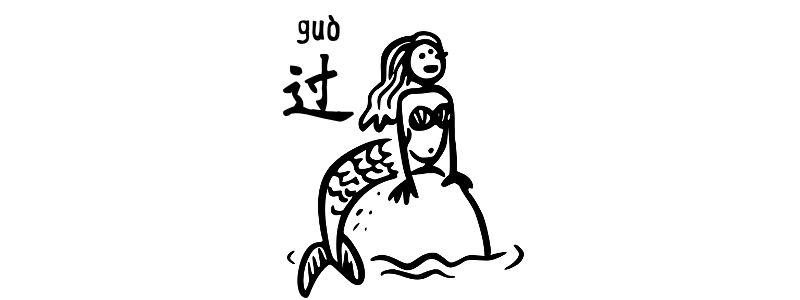Grammar Point:
The particle 过 guò is used to talk about something you have or haven’t experienced in the past. It always goes right after the verb.
Structure
S + V + 过 guò + O
我去過中國我去过中国
I have been to China.
你看過這部電影嗎?你看过这部电影吗?
Have you seen this movie before?
我見過他我见过他
I have met him before.
我說過嗎?我说过吗?
Have I said that before?
Topic + S + V + 过 guò
The topic in spoken Chinese is often placed at the beginning of the sentence, followed by the question or statement. For example, “This movie, did you see it?” This is not a very formal way of speaking, but it is very common in casual conversations.
這部電影你看過嗎?这部电影你看过吗?
Have you seen this movie before?
他我見過他我见过
I have met him before.
臭豆腐他吃過臭豆腐他吃过
He had tried stinky tofu before.
他家我去過,很大很漂亮!他家我去过,很大很漂亮!
I’ve been to his house. It’s big and beautiful!
Negation
Since you are talking about a past experience, something that you did not choose on your own, you will always use 没(有) méi(yǒu) to indicate that you have never experienced it.
📚 Chinese grammar of 不 bù and 沒 méi
他沒有吃過臭豆腐他没有吃过臭豆腐
He had never tried stinky tofu before.
我沒有學過中文我没有学过中文
I’ve never studied Chinese before.
他我沒愛過他我没爱过
I’ve never loved him before.
這話我沒說過这话我没说过
I’ve never said that.
Negation + Never (to emphasize)
Because 过 guò is used to describe past experiences, you can combine it with 从来没(有) cónglái méiyǒu to emphasize that something has never happened.
我從來沒有學過中文我从来没有学过中文
I’ve never studied Chinese before.
他從來沒想過要當中文老師他从来没想过要当中文老师
He never thought of becoming a Chinese teacher.
我從來沒有這麼累過我从来没有这么累过
I’ve never been so tired before.
Here you may be wondering why I used “tired” here since it’s not typically used as a verb in English. The answer is that in Chinese, adjectives are considered stative verbs, meaning they are a type of verb. Therefore, “tired” can be used as a verb in this context.
The difference between 了1 le and 过 guò
过 guò refers to experiences that can be repeated.
了1 le refers to a complete action that is a single occurrence at one specific time.
他去過很多國家他去过很多国家
He has been to many countries before. (from past through the present.)
他去了很多國家他去了很多国家
He went to many countries. (during his last trip)
他吃過臭豆腐他吃过臭豆腐
He has tried stinky tofu before. (He has experienced it)
他吃了臭豆腐他吃了臭豆腐
He ate stinky tofu. (maybe yesterday)
他結過婚他结过婚
He was married.
(过 guò is an aspect particle indicating that the action of getting married has happened before in the past, and it emphasizes the experiential aspect of the action. It suggests that he has had the experience of being married at least once in the past.)
他結了婚他结了婚
He got married.
(了1 le is an aspect particle indicating the completion of an action. It suggests that he has completed the action of getting married, and it doesn’t give any information about whether he has been married before or not or whether the marriage is ongoing.)
Chinese grammar guo
How about了2 le and 过 guò ?
了2 le refers to a changed state. It is used to emphasize that the situation is different compared to before. When it combines with 过 guò, you get something like “it is now the case that something has been done.” This is nearly always used to talk about frequent, everyday actions.
你吃飯了嗎?你吃饭了吗?
Have you eaten?
(It’s a general question about whether the person has eaten or not, without any reference to a specific time.)
你吃過飯了嗎?你吃过饭了吗?
Have you already eaten?
(he use of “guò” implies that the question is about whether the person has eaten at some specific time in the past, and now it is relevant to know whether they have eaten or not.)
我吃飯了我吃饭了
I’ve eaten.
(It simply states that the speaker has eaten a meal, without any reference to whether it was in the past or present.)
我吃過飯了我吃过饭了
I’ve already eaten.
(It implies the speaker has already eaten a meal at some point in the past.)
For example, if someone asked, “Are you hungry?” and you had just finished eating, you could reply with 我吃過飯了我吃过饭了 (I’ve already eaten), emphasizing that you are not currently hungry because you have eaten already. On the other hand, if someone simply asked, “Have you eaten?” you could reply with 我吃飯了我吃饭了 (I’ve eaten), without any emphasis on when you ate.
Common mistake
A common mistake is placing 过 guò after the object in a sentence. For example:
他結婚過他结婚过 ❌
He was married.
他結過婚他结过婚 ✅
He was married.
Practice
TouchHover over the space to see the answers.
✔️ I have never lived alone.
我沒一個人住過我没一个人住过
✔️ Have you ever thought about why he is angry?
你想過他為什麼生氣嗎?你想过他为什么生气吗?
✔️ Has he looked in the mirror?
他照過鏡子嗎?他照过镜子吗?
FYI
(It is from a Chinese slang. This expression is often used in a confrontational or critical manner towards someone who is being hypocritical or self-righteous, implying that they should reflect on their own behavior before criticizing others. It can also be used to mean “mind your own business” or “stop being so judgmental. Another way to say it is 也不照照镜子 yě bú zhào zhào jìngzi.)


